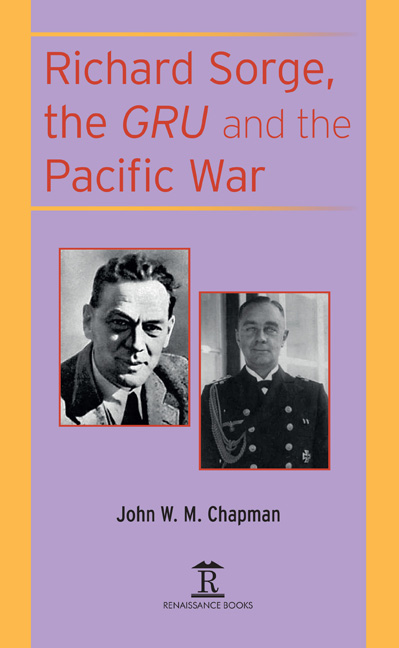Book contents
- Frontmatter
- Contents
- Chart: Organization of the People’s Commisariat for the Defence of the USSR,1941
- Preface
- Introduction
- Abbreviations
- List of Illustrations
- 1 ‘All is Not Well in the Camp of the Axis Powers’: Karl von Wiegand to Hearst Press, 20 November 1941
- 2 ‘In the Matter Affecting Ambassador Ott’
- 3 The Purge of German Journalists
- 4 ‘Expressions which are Psychologically Dangerous’: General Jodl to Admiral Wenneker 24.12.1942
- 5 The Bifurcation of Intelligence in Retrospect, 1929–1937
- 6 The Bifurcation of Intelligence in Retrospect, 1937–1941
- 7 Conclusions
- Select Bibliography
- Source Materials
- Index of Persons
- Index
- List of Contributors
3 - The Purge of German Journalists
- Frontmatter
- Contents
- Chart: Organization of the People’s Commisariat for the Defence of the USSR,1941
- Preface
- Introduction
- Abbreviations
- List of Illustrations
- 1 ‘All is Not Well in the Camp of the Axis Powers’: Karl von Wiegand to Hearst Press, 20 November 1941
- 2 ‘In the Matter Affecting Ambassador Ott’
- 3 The Purge of German Journalists
- 4 ‘Expressions which are Psychologically Dangerous’: General Jodl to Admiral Wenneker 24.12.1942
- 5 The Bifurcation of Intelligence in Retrospect, 1929–1937
- 6 The Bifurcation of Intelligence in Retrospect, 1937–1941
- 7 Conclusions
- Select Bibliography
- Source Materials
- Index of Persons
- Index
- List of Contributors
Summary
FACED WITH THE need to recognise that the Sorge ring had covered its activities with the greatest care by endeavouring to conceal their covert operations through the device of obtaining respectable professional employment and, in Sorge's case, also of pursuing an outwardly Bohemian style of social behaviour, Meisinger embarked on a course of vetting members of the German community to test the extent of their willingness to adhere to perceived National Socialist ideals and of their underlying support of the regime. With the outbreak of war, his congratulations to his hosts were accompanied by the submission of lists of German citizens deemed by him to be ‘unreliable’ – a term which covered a wide range of possibilities beyond the unacceptable norms associated with racial, political and social exclusion.
The rapid expansion of Japanese control in Asia also facilitated the restoration of German activities southwards and enabled him to arrange for the appointment of his predecessor, Huber, as police liaison in Thailand. Huber was linked in with the arrangements for co-operation with the Japanese Army's tokumu kikan, headed by Colonel Iwagurō Takeo, which had been initiated following the appointment of Colonel Scholl as military attaché at Bangkok in July 1941. These contacts were accompanied by efforts at the expansion of the Abwehr organisation in China and were also linked to secret efforts by Admiral Wenneker to make contact with the German vessels which had taken refuge at the outbreak of war in Portuguese India.
Huber called on the support of the Gestapo to vet the small numbers of German residents in Thailand and suspicion fell quite soon on the Austrian photo-journalist, Karl-Raimund Hofmeier, working for the Völkischer Beobachter, who had been given the unique opportunity as a non-Japanese to accompany invading Japanese forces, a role akin to that previously accorded to Ivar Lissner when working for the same newspaper in 1938. As it was discovered at this time that Lissner appeared to have obtained a close relationship with the Japanese Army covert intelligence service, there was a strong suspicion that both Lissner and Hofmeier were operating in Japanese interest and that their double life bore comparison with that now proven to be the case with Sorge and Clausen working for the USSR.
- Type
- Chapter
- Information
- Richard Sorge, the GRU and the Pacific War , pp. 27 - 41Publisher: Amsterdam University PressPrint publication year: 2020

